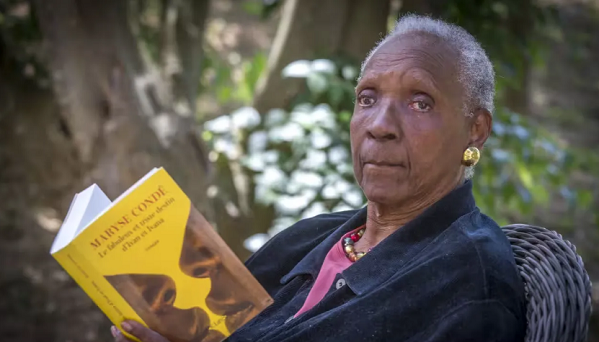
In “From Segou to Salem. Four joyously heartbreaking novels by Maryse Condé” (The Radical Cape Reading Room) D. S. Battistoli offers a heartfelt tribute to Condé (1934-2024) while offering glimpses into his correspondence with the beloved author as well as critical analyses of Ségou, Moi, Tituba sorcière…, Les derniers rois mages, and Traversée de la mangrove.
Each book I have by Maryse Condé is indelibly connected in my mind with the city in which I bought it. Cayenne. Dakar. Port au Prince. It was in 2016, after returning to Dakar by bus from Bamako after a few months working in Sikasso, that I bought Ségou. I then had a series of contracts in Haiti during the course of which I read Ségou’s first volume. From my home base in Suriname, I would cross the border into French Guyane and take Air France’s Miami-bound shuttle flight, getting off in Port au Prince. I bought Moi, Tituba sorcière… there, and Les derniers rois mages in Cayenne. Back here in Dakar, I bought Traversée de la mangrove.
Via the magic of email, I asked Condé two questions over the years, getting kind answers, but I’m getting ahead of myself.
I. The memorial business.
Condé passed away in April 2024 at the age of 90. Soon there were new print runs of many of her books; I don’t know how quickly they hit the shelves in other cities, but here in Dakar, we started to see them in 2025. I had never before encountered copies of several of them. One, La traversée de la mangrove, I had last seen in a Haitian bookstore. Now I snatched up one copy of each available book, reading Traversée first. [. . .]
Including the two-volume epic novel Ségou, the four books under consideration here all come from eight years of Condé’s great middle period, finishing off with Rois. Ségou, Tituba, Traversée and Rois are four tours de force through black geographies and history. [. . .]
Without ever stating that as her goal, Condé leads her readers to ponder the different meanings of Creole. To what extent is being Creole the identity of being born in the Global South in the modern world? To what extent is it a mixture of identities? Is it everywhere, or is creolity really only something that exists in and around the Caribbean? [. . .]
IV. Were you there when they laid him in the tomb?
Condé, whether her novel centers in Africa, in the Caribbean, or in North America, does something a little unique among novelists of the Black Atlantic, but quite representative of Caribbean popular attitudes generally: she repeatedly shows black characters doubting or distrusting Maroons, that is, people who escaped slavery and went to live in the backcountry. [. . .]
V. What to the slave is Plymouth Rock?
Condé’s own value was and is almost illimitable. Aimé Césaire and Frantz Fanon, both of Martinique, both also remember how Guadeloupe was the disrespected junior island of the French Antilles in the early twentieth century. When writing that, neither yet knew Condé.16 As much as she loved returning to Guadaloupe with its symmetries and contradictions, she refused from the beginning and to the end to be exclusively a writer on Guadeloupean or Caribbean topics.
[. . .] Spéro’s attempt to associate himself with the future-facing city of Charleston instead of the resistant and yielding islands is untenable. If Condé, unlike Morrison, does not shove her hero off a cliff, she agrees with Morrison on the only way forward.
The only way forward for Spéro, drenched in rain, is back. A path that with Condé is never as solid and direct as it seems.
For full article, visit https://samuelbattistoli.substack.com/p/from-segou-to-salem
[D. S. Battistoli’s note: “Guadeloupean novelist Maryse Condé in a publicity photo from the Associated Press, taken on the occasion of the publication of her novel Le fabuleux et triste destin d’Ivan et d’Ivana in 2019. By this time Condé had lost her sight and was dictating her ever-prolific work and correspondence.”]
In “From Segou to Salem. Four joyously heartbreaking novels by Maryse Condé” (The Radical Cape Reading Room) D. S. Battistoli offers a heartfelt tribute to Condé (1934-2024) while offering glimpses into his correspondence with the beloved author as well as critical analyses of Ségou, Moi, Tituba sorcière…, Les derniers rois mages, and Traversée de la
